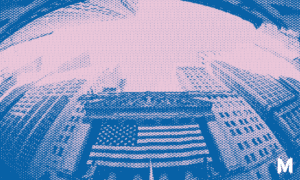Today’s roundup on Bitcoin news:
- The bitcoin price fell 4.5% minutes after the U.S. consumer price index showed June inflation rising to 9.1% but has since recovered
- Benjamin Cowen talked about how the current inflation affects bitcoin and stocks
- Bank of America’s recent survey on bitcoin.
- After reportedly paying off the last DeFi loan, Celsius started its Chapter 11 bankruptcy preparations
- Michael Barr was appointed as vice chairman for supervision at the Federal Reserve.
Bitcoin’s price fluctuated Wednesday morning after the U.S. consumer price index (CPI) revealed June inflation at 9.1%, hitting a 40-year high.
The price plummeted to $18,919, the lowest the market has seen in the past 10 days. The downward spike only lasted for a while. Bitcoin has since climbed back, up 2% over the past 24 hours and trading at around $19,700. It is currently back to where it was before the sudden drop.
Benjamin Cowen and his insights on how inflation might affect Bitcoin and the stock market.
Benjamin Cowen talked about the recent inflation data and how it may affect bitcoin and stocks according to previous data on the market. He used the example of July 1972, when the inflation went up and peaked in December 1974, 32 months after. The current inflation’s local bottom started around June 2020, and it has been 23 months since then. According to this date, he stated that we might need months to see the inflation going down.
He looked at how the S&P 500 reacted during these periods to see how Bitcoin might behave in relation to our current inflation. From those prior periods of inflation, he found that the S&P bottomed right around when the inflation peaked. Furthermore, he found that during the second peak of these periods of inflation, the S&P 500 is heading higher. He mentioned that “When inflation is at its peak, investors should get a strong position in the market. Even when you didn’t time the exact bottom, you will still have a great return once the second peak happens.”
He emphasized that right now, according to the market data, bitcoin is highly correlated with the stock market, especially with tech stocks. “I think it is safe to assume that we have time. Like, you have time and you don’t necessarily have to time the bottom to be successful. You need to have a strategy to slowly move into the market during a period where you think are close to inflation peaking.” He said in his YouTube video.
He showed his viewers the chart of bitcoin and pointed out that after every bear market, there is a reaccumulation phase where it goes sideways. He stated that bitcoin is going to have some type of reaccumulation phase in the next year or so. During this period, he advised his viewers to get a strong position before the next bull market.
Bank of America is bullish on Bitcoin
Bank of America has recently shared an optimistic chart in its June 2022 global research report. The chart, created by Lyn Alden, gave an image of how Bitcoin survived crashes over the years and bounced back to new all-time highs. “Declines bring out skeptics. Critics are quick to claim bitcoin’s demise has arrived”, but that it usually rebounds.
Bank of America through their survey found out that over 90% of respondents are planning to buy Bitcoin by the end of 2022. Many even plan to buy Bitcoin in the next six months.
When asked why people wanted to own Bitcoin, Jason Kupferberg, a senior BOA analyst mentioned that using Bitcoin for payments was interesting because a company like Coinbase could link with merchants. This allows people to spend their assets without needing to do the spot conversion themselves.
Bank of America has approved Bitcoin Futures Trading for some of its clients back in 2021. Their research unfortunately is not looking only into Bitcoin but also altcoins. But, with 90% support for buying Bitcoin in 2022 or later, this survey is massively bullish for bitcoin
Celsius’s next move to remain afloat.
A source has told CNBC that “Celsius lawyers were notifying U.S. state regulators Wednesday evening, and Celsius plans to file paperwork imminently.” This refers to the news that Celcius, the crypto lender firm, has started Chapter 11 bankruptcy preparations.
“These Chapter 11 cases provide the Company with the best opportunity to stabilize the business, consummate a comprehensive restructuring transaction that maximizes value for all stakeholders, and emerge from Chapter 11 positioned for success in the cryptocurrency industry.” Stated the firm in their blog post regarding the matter.
Celsius, which has been battling with liquidity troubles, recently fully paid off its remaining debt to the decentralized finance (DeFi) lending protocol Compound, and gained back its 10,000 Wrapped Bitcoin tokens worth nearly $200 million of pledged collateral.
The firm paid down $50 million to Compound early Wednesday. After Compound released 10,000 wrapped bitcoin tokens to Celsius, Celsius then transferred them to the same unlabeled wallet address where the firm’s 416,000 Staked Ether ended up the day before.
The move was similar to what Celsius did to pay off its loans from other DeFi lending protocols Aave and Maker. As a result, it reclaimed more than a billion dollars worth of its crypto assets, mostly in wrapped bitcoin and staked Ether.
Celsius is among the crypto lenders crippled by the recent liquidity crisis. By filing for Chapter 11 bankruptcy, Celcius is still hoping to get out of it and continuing its operation, maintaining its assets, and hopefully will be able to pay its debt using the profits it is going to make. Hopefully.
The new vice chairman of supervision at the Federal Reserve
The U.S. Senate had approved the appointment of Michael Barr as the new vice chairman of supervision at the Federal Reserve. This event popped up on Coindesk with the headline “Former Crypto Adviser Michael Barr Confirmed as Top U.S. Financial Watchdog”.
The former Ripple adviser who served in Obama’s treasury department will take charge of monitoring U.S. banking. This position allows him to have the power to influence how the traditional financial system interacts with cryptocurrencies.
Although coming up with a notable background in crypto, it is unsure whether or not the crypto industry should be happy with Barr taking the position.
“A 2020 paper he co-authored cited research that assets such as bitcoin (BTC) “not only generate huge mining costs, but are also inefficient in their long-run design.” Stated Jesse Hamilton in the news article he wrote about Barr’s appointment.
The decision on issuing a digital dollar is on the Fed’s agenda. This move will have an intense impact on private, dollar-based stablecoins. What worries people in the crypto industry is that Barr has suggested that a central bank digital currency (CBDC) could boost the government’s ability to offer banking and financial services to individuals.




